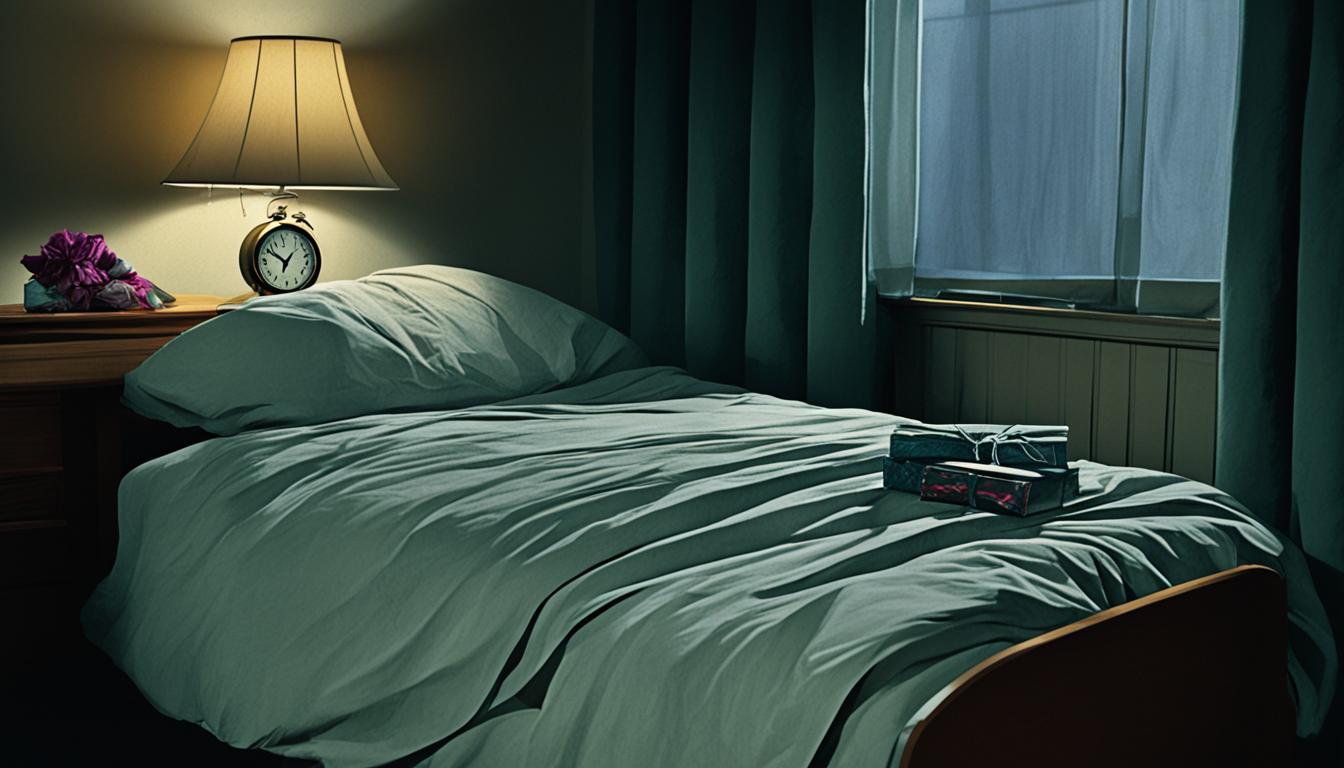Feeling unloved and unwanted can be a devastating experience. When your husband doesn’t love you anymore, it can leave you feeling lost, confused, and filled with pain. The signs of love fading in a relationship can vary, but it’s important to address these feelings and find ways to cope with the love loss.
There can be various reasons why your husband may no longer feel the same love for you. It could be a loss of spark, a clash of values, or even unresolved issues from the past. Childhood experiences and past trauma can also play a role in feeling unloved in a relationship.
Understanding your own emotions and your partner’s patterns of behavior is crucial. Take the time to reflect on your feelings and examine any underlying issues that may be contributing to the love loss. Communication is the key to addressing this issue and finding a way forward.
Key Takeaways:
- Feeling unloved in a relationship is a common experience that can be emotionally challenging.
- Signs of love fading can include a lack of attention and affection, a decrease in intimacy, and constant arguments.
- Coping with love loss requires self-reflection, open communication, and seeking professional help if needed.
- Understanding your own emotions and addressing underlying issues is essential in rebuilding love in the relationship.
- Remember that every relationship is unique, and what works for one couple may not work for another.
Understanding Unwanted Feelings in a Relationship
Feeling unloved in a relationship can be an incredibly difficult experience. It can evoke a range of emotions, including feelings of despair, sadness, and even depression. This emotional state can often stem from a variety of factors and can have a profound impact on one’s well-being.
When you feel unloved in a relationship, it’s important to understand that these feelings may be triggered by a combination of factors. Feelings of jealousy, anxiety, and loneliness can exacerbate the perception of being unloved. These negative emotions can create a vicious cycle, making it even more challenging to address the underlying issues.
It’s crucial to recognize that feeling unloved might be linked to personal insecurities, attachment issues, or unresolved trauma from the past. These factors can significantly impact your ability to feel secure and loved in your current relationship. By understanding the root causes of these feelings, you can begin to explore strategies to address and overcome them.
“It’s crucial to recognize that feeling unloved might be linked to personal insecurities, attachment issues, or unresolved trauma from the past.”
Recognizing and acknowledging these unwanted feelings is the first step towards finding a solution. By exploring your own emotions and understanding your triggers, you can gain a deeper insight into why you might be feeling unloved in your relationship. This self-reflection can provide a starting point for growth and healing.
Remember, addressing feelings of being unloved in a relationship requires open and honest communication with your partner. Sharing your emotions, concerns, and needs can foster understanding and pave the way for positive change. By working together, you can rebuild trust, rekindle love, and create a more fulfilling and secure bond.

Signs of Feeling Unwanted
Feeling unwanted in a relationship can be a distressing experience. If you have been questioning whether your husband still loves you, it is important to be aware of the signs that may indicate feeling unwanted. While every relationship is unique, there are common indicators that can help you identify if your husband doesn’t love you as he once did.
One sign to look out for is a lack of attention and affection from your partner. If you notice a decline in the amount of quality time spent together, reduced physical affection, or if your husband seems distant and preoccupied, it may be an indication that he is not emotionally invested in the relationship.
Another sign to consider is a decrease in intimacy. Intimacy is an essential aspect of any loving relationship. If you and your partner have experienced a noticeable decline in physical intimacy or if your husband consistently avoids engaging in intimate moments, it could be a sign of emotional detachment.
Constant arguments or misunderstandings can also be red flags. If you find that you and your husband are frequently fighting or struggling to communicate effectively, it may be indicative of deeper issues within the relationship. These conflicts can arise from unaddressed emotional needs or a lack of effort to understand and support each other.
Feeling ignored or taken for granted is another sign that your husband may not love you as he should. When your needs and emotions go unnoticed or unappreciated, it can lead to feelings of unworthiness and being unwanted. If you often feel like your presence doesn’t matter or that your efforts are not valued, it is essential to address these concerns with your husband.
Remember, these signs should not be viewed in isolation but as potential indications that something might be amiss in your relationship. It is crucial to have open and honest conversations with your partner to better understand his perspective and to express your own feelings. Seeking professional help from a couples therapist can also provide guidance and support in navigating these complex emotions and relationship dynamics.

Recognizing and addressing the signs of feeling unwanted can be the first step towards healing and rebuilding your relationship. By addressing these issues, you can work together to create a healthier, more loving and fulfilling partnership.
Coping Strategies for Feeling Unloved
When feeling unloved in a relationship, it is important to take proactive steps to address the issue. Coping with love loss can be challenging, but there are strategies you can implement to rebuild love in your marriage.
Start by connecting with your own feelings. Take the time to reflect on how you are truly feeling and why. Understanding your own emotions is crucial in order to effectively communicate your needs to your partner.
It is also important to understand your attachment style. This refers to the way you emotionally bond with your partner. By understanding your attachment style, you can gain insight into your reactions and behaviors in the relationship.

Unpacking any beliefs that may be contributing to feeling unloved is another important step. Sometimes, past experiences or negative beliefs can impact our perception of love and connection. Challenge these beliefs and replace them with more positive and realistic ones.
Open and Honest Communication
Open and honest communication with your partner is crucial when dealing with feelings of being unloved. Expressing your emotions, concerns, and needs can help create a safe space for both of you to address the issue. Avoid blaming or accusing your partner, and instead focus on expressing how their actions or words make you feel.
Additionally, expressing appreciation for your partner’s efforts and affirming your love for them can help rebuild the connection. Small gestures of love and kindness can go a long way in reigniting the spark in your relationship.
Self-Care and Seeking Support
Practicing self-care is essential when coping with love loss. Take time for yourself to engage in activities that bring you joy and fulfillment. This can help improve your overall well-being and bring a positive energy into the relationship.
Seeking support from therapists or support groups can also be beneficial. They can provide guidance, perspective, and tools to help you navigate the challenges you are facing. Consider professional couples counseling as well, as it can provide a structured environment for both partners to work through their issues and rebuild love in the marriage.
Remember, rebuilding love in a marriage takes time and effort from both partners. Stay committed to the process and believe in the potential for change and growth. With the right strategies and support, it is possible to overcome the feeling of being unloved and create a stronger, more fulfilling relationship.
When to Seek Help
If your efforts to address feeling unloved in your relationship have not yielded positive results, it may be beneficial to seek professional help. Marriage counseling can provide a safe and supportive space for both partners to explore their emotions, improve communication, and work towards rebuilding love and connection in the marriage. A therapist can help guide the process and provide strategies to navigate challenges and find solutions.
Marriage counseling is particularly helpful when there is a marriage counseling for love issues or an emotional disconnect in marriage. It allows couples to identify underlying issues, heal past wounds, and learn effective communication and problem-solving skills.
Marriage counselors are trained professionals who can offer insights and perspectives that may be challenging to see on your own. They can provide a neutral environment where both partners can freely express their feelings and concerns without fear of judgment.
Through marriage counseling for love issues, couples can learn techniques to deepen their emotional connection, rebuild trust, and reignite the spark in their relationship. The guidance and support of a therapist can help couples navigate difficult conversations, resolve conflicts, and develop a stronger foundation for their future together.
Remember, seeking help is not a sign of weakness but rather a proactive step towards improving your relationship. It takes courage to acknowledge when you need assistance and to take action to make positive changes.

Conclusion
Feeling unloved in a relationship can be a challenging and distressing experience, but it doesn’t have to be the end of love. By taking the time for self-reflection and acknowledging the communication problems within the relationship, you can start the journey towards rebuilding love in your marriage.
Open and honest communication with your partner is key. It’s important to express your feelings, needs, and concerns, and to listen actively to your partner as well. By fostering a safe and supportive space for both of you to share your emotions, you can begin to address the underlying issues that may be contributing to the lack of love and connection.
Remember, every relationship is unique, and there is no one-size-fits-all solution. What works for one couple may not work for another. Therefore, it’s crucial to trust the process and stay committed to making positive changes. Seek professional help, such as couples counseling, if needed, as a trained therapist can provide guidance and support through the rebuilding process.
Rebuilding love in a marriage takes time, effort, and patience. By prioritizing open communication, addressing relationship communication problems, and seeking help when necessary, you can create a more fulfilling and loving connection that sustains and grows over time.
FAQ
What are some common signs of feeling unwanted in a relationship?
Some common signs include a lack of attention and affection from your partner, a decrease in intimacy, constant arguments or misunderstandings, and a feeling of being ignored or taken for granted.
How do I cope with the feeling of being unloved?
Coping strategies include connecting with your own feelings, understanding your attachment style, and unpacking any beliefs that may be contributing to feeling unloved. Open and honest communication with your partner is crucial, as well as practicing self-care, seeking support from therapists or support groups, and considering professional couples counseling if necessary.
When should I seek professional help for feeling unloved in my relationship?
If your efforts to address feeling unloved in your relationship have not yielded positive results, it may be beneficial to seek professional help. Marriage counseling can provide a safe and supportive space for both partners to explore their emotions, improve communication, and work towards rebuilding love and connection in the marriage.
Is feeling unloved in a relationship a common issue?
Yes, feeling unloved in a relationship is a common issue that can cause significant distress. However, it is not an insurmountable problem. With self-reflection, open communication, and a willingness to seek help when needed, it is possible to rebuild love and connection in a marriage.
Source Links
- https://www.marriage.com/advice/relationship/love-feeling-unloved-in-relationships/
- https://www.verywellmind.com/what-to-do-if-you-feel-unwanted-in-a-relationship-5190378
- https://www.netmums.com/coffeehouse/life-504/family-other-relationships-50/326757-husband-doesnt-love-me-anymore.html


